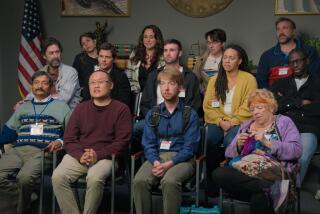AFS Students Have a Good Day in Court
- Share via
Juliana Licinic stared straight at a jury of her peers and claimed that she should be found innocent of charges of driving a stolen car. She was not stealing the car, merely returning it to the rightful owner, she said.
“Besides,” she laughed, “I don’t even know how to drive.”
Licinic, 18, an exchange student from Yugoslavia, had her day in court Wednesday at the Orange County Superior Court in Santa Ana. Her “trial” was really a mock one. The “jury” consisted of other foreign exchange students who spent the morning learning about the American judicial system.
The 22 students from 18 countries who participated are living with Orange County families for a year as part of the American Field Service program, an international nonprofit organization, which matches foreign teen-agers with American sponsors.
To show the students the administration of American law during their stay here, the AFS schedules annual field trips to the courthouse.
“Court systems are different everywhere, and we want to show how our court system is run,” said AFS district representative Alice Fischer.
Worked From Scripts
The students--acting as judge, lawyers, clerk, bailiff, witnesses and the defendant--staged a mock court case, in which they read from scripts. Afterward, some said they were surprised to learn a tenet of American justice--that the burden of proof of guilt lies with the prosecution.
“The people here have all of the opportunity to present their side,” said Juan Borrero of Colombia. “The people seem like they have a lot of rights. It is not up to the (defendant) to prove that he is not guilty.”
The students also visited the courtroom of Superior Court Judge Richard J. Beacom, who is presiding over a jury trial involving a kidnaping and rape. Most of the students sat on the edges of their seats, engrossed in a witness’s testimony.
The complex case involves two men charged with kidnaping and rape. One man already has been tried and convicted. The other was on trial.
Afterward the students questioned defense attorney James Brustman and Deputy Dist. Atty. Marvin A. Stern about cases in general.
“Were defendants always in custody while on trial?” the students wanted to know.
Attorneys told them defendants often can be out on bail.
Joakim Westberg, 19, of Sweden asked why sensitive cases, such as the one he had just seen, were open to the public. “In Denmark, a case like this would probably be closed,” he said. Usually courtrooms are open to the public, he was told.
The exchange students, who arrived at the end of summer, are from a variety of countries, also including Peru, Australia, Uruguay, Italy, New Zealand, South Africa, Belgium and Paraguay.
Families in Orange County have played host to more than 800 students since the AFS began a chapter here in 1955. Founded in 1947, the organization has offices in Australia, Europe, South America, Southeast Asia, Africa, the Middle East, New Zealand and Greenland.
Most students pay a $4,000 fee to participate, but scholarships are available, said district representative Fischer. Sponsoring families, who receive no money, are selected on the basis of their “warmth, friendliness and flexibility,” she said.
Earlier at the mock trial, held in a room in the courthouse cafeteria, students were full of questions such as: Do people get paid for sitting on a jury? Who chooses the jury?
Alessio Ciuffoletti, 17, of Italy said one difference between the courts in this country and those at home was a more reasonably sized security force. “When I went into a court back home, it was full of cops. There were cops everywhere,” he said.
Juan Borrero said that the court was “just like what I have seen on television.”
Laura Astigarraga said the composition of juries was somewhat different in her native Uruguay. She was surprised that jurors are ordinary citizens. “At home, the people who decide, the jury, are people who prepare for it. It is not just anybody.” Jurors there study the case and the laws, she said.
Juliana Licinic, the “mock” auto thief, wound up not knowing the outcome of her case because, unlike a real trial, the students ran out of time. “I’ve never been to any court before . . . this seems well organized but very confusing,” she said. “It must be hard for people to come up with a decision.”
Said Willy Del Campo, 18, of Peru: “This judicial system here is not perfect. But it’s good.”
More to Read
Sign up for Essential California
The most important California stories and recommendations in your inbox every morning.
You may occasionally receive promotional content from the Los Angeles Times.













